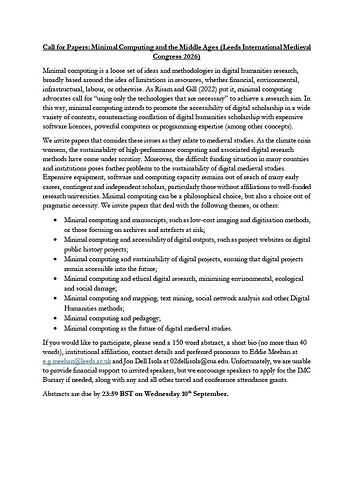[AI-Generated Summary]: Minimal computing is a loose set of ideas and methodologies in digital humanities research, broadly based around the idea of limitations in resources, whether financial, environmental, infrastructural, labour, or otherwise. As Risam and Gill (2022) put it, minimal computing advocates call for “using only the technologies that are necessary” to achieve a research aim. In this way, minimal computing intends to promote the accessibility of digital scholarship in a wide variety of contexts, counteracting conflation of digital humanities scholarship with expensive software licences, powerful computers or programming expertise (among other concepts).
- Deadline: September 10, 2025 at 23:59 BST
- Conference: International Medieval Congress 2026, Leeds
- Format: Conference session
Call for Papers
We invite papers that consider minimal computing issues as they relate to medieval studies. As the climate crisis worsens, the sustainability of high-performance computing and associated digital research methods have come under scrutiny. Moreover, the difficult funding situation in many countries and institutions poses further problems to the sustainability of digital medieval studies. Expensive equipment, software and computing capacity remains out of reach of many early career, contingent and independent scholars, particularly those without affiliations to well-funded research universities. Minimal computing can be a philosophical choice, but also a choice out of pragmatic necessity.
Submission Details
If you would like to participate, please send:
- 150 word abstract
- Short bio (no more than 40 words)
- Institutional affiliation
- Contact details and preferred pronouns
Submit to:
- Eddie Meehan: e.g.meehan@leeds.ac.uk
- Jon Dell Isola: 02dellisola@cua.edu
Abstracts are due by 23:59 BST on Wednesday 10th September.
